[fusion_builder_container hundred_percent=”no” hundred_percent_height=”no” hundred_percent_height_scroll=”no” hundred_percent_height_center_content=”yes” equal_height_columns=”no” hide_on_mobile=”small-visibility,medium-visibility,large-visibility” status=”published” class=”@media only screen and ( min-width: 800px ) {padding-top: 0px; padding-right: 5px; padding-bottom: 0px; padding-left: 5px; }” background_position=”center center” background_repeat=”no-repeat” fade=”no” background_parallax=”none” enable_mobile=”no” parallax_speed=”0.3″ video_aspect_ratio=”16:9″ video_loop=”yes” video_mute=”yes” border_style=”solid” padding_right=”%” padding_left=”7%” admin_label=”Large Screen text” flex_column_spacing=”0px” type=”legacy”][fusion_builder_row][fusion_builder_column type=”1_1″ layout=”1_1″ spacing=”” center_content=”no” link=”” target=”_self” min_height=”” hide_on_mobile=”small-visibility,medium-visibility,large-visibility” class=”” id=”” background_color=”” background_image=”” background_image_id=”” background_position=”left top” background_repeat=”no-repeat” hover_type=”none” border_color=”” border_style=”solid” border_position=”all” border_radius=”” box_shadow=”no” dimension_box_shadow=”” box_shadow_blur=”0″ box_shadow_spread=”0″ box_shadow_color=”” box_shadow_style=”” padding_top=”” padding_right=”” padding_bottom=”” padding_left=”0px” margin_top=”” margin_bottom=”” animation_type=”” animation_direction=”left” animation_speed=”0.3″ animation_offset=”” last=”true” first=”true” border_sizes_top=”0px” border_sizes_bottom=”0px” border_sizes_left=”0px” border_sizes_right=”0px” type=”1_1″][fusion_text columns=”” column_min_width=”” column_spacing=”” rule_style=”default” rule_size=”” rule_color=”” hide_on_mobile=”small-visibility,medium-visibility,large-visibility” class=”” id=”” animation_type=”” animation_direction=”left” animation_speed=”0.3″ animation_offset=””]
[/fusion_text][fusion_text columns=”” column_min_width=”” column_spacing=”” rule_style=”default” rule_size=”” rule_color=”” content_alignment_medium=”” content_alignment_small=”” content_alignment=”” hide_on_mobile=”small-visibility,medium-visibility,large-visibility” sticky_display=”normal,sticky” class=”” id=”” font_size=”” fusion_font_family_text_font=”” fusion_font_variant_text_font=”” line_height=”” letter_spacing=”” text_color=”” animation_type=”” animation_direction=”left” animation_speed=”0.3″ animation_offset=””]
How to Define Your Personal Philosophy
Choice is both the biggest opportunity for life purpose and the biggest cause of stress in our lives.
Life is full of choices. (I know, what a profound statement.) Some of them are small. We choose what to eat for lunch, who to text, what to watch on TV. Conversely, some choices are quite significant. We choose what to do for work, who to marry, and where to live.
And then there are the overarching choices. You know, the ones that come to define our lives. Choices that attempt to answer questions like, How do you want to spend your time? What type of person do you want to be? What life do you want to live? (Casual, right?)
The problem is that these big overarching questions aren’t quickly answered. We can’t simply know the answers. Over time, we have to discover them – a process that requires self-awareness, vulnerability, and a lot of patience.
Thousands of little decisions and actions add up to who we are as a person.
Unfortunately, this seemingly beautiful process isn’t always so beautiful.
More often than not, it’s exhausting. Decisions lose their beauty in the face of stress and anxiety. We end up feeling more lost than when we started.
Don’t worry; it’s not all hopeless. Defining your personal philosophy can help.
.
Our human nature and our society team up to make self-discovery hard.
Before we drive into what a personal philosophy is (and how to define your personal philosophy), let’s take a quick look at what makes life choices so darn tricky.
Culprit number one: our human nature makes decision-making stressful.
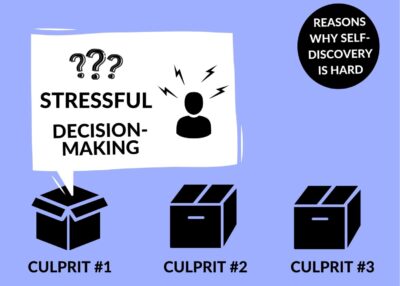
The human brain has evolved over millions of years. For each new adaptation, a few of the old functions remained. What used to keep us safe and alive (aka fight-or-flight survival instincts) now wreaks havoc on our emotional states.
In other words, our bodies and brains begin to view life choices as threats.
Some of the ways our psychology makes choices so darn tricky and stressful include:
- Our emotions drive our behavior, not our actions. This means that our thinking brain (often logical and rational) is not in charge of our decision-making. Instead, we’re ruled by fear and anxiety.
- Our brains crave predictability and control. Fear of the unknown is one of the strongest fears that humans have. Therefore, any sort of uncertainty or change becomes uncomfortable and scary.
- Our brains fixate more on negativity than positivity. We’re wired to hate losing more than gaining, and we focus on what we’re lacking rather than what we have. These three elements all heighten the anxiety of decision-making.
Now you have a basic understanding of how your brain is working against your decision-making. (Wow, thanks, brain. I’m really loving the anxiety you’re throwing my way!)
Taking steps to define your personal philosophy will help. But before we get to that, let’s turn to how external factors make life choices more stressful.
.
Culprit number two: we’re far more influenced by social norms than we realize.
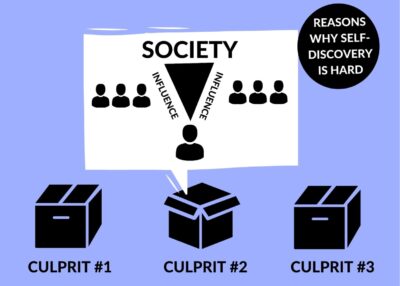
As if our psychology doesn’t already do enough, our innate need for belonging also adds a layer of stress to making decisions.
You see, in prehistoric times, we relied on our social belonging to survive. This need didn’t go away; it merely changed. We still need to feel accepted and appreciated by the people around us.
In many ways, feeling a sense of belonging is positive. Our relationships give us meaning and happiness. They also help improve our psychological and physical health. (Namely, because they are a need, not a want.)
Unfortunately, this need also makes decision-making more stressful.
- We’re terrified of rejection. This fear often manifests itself in the form of shame, which keeps many of us from choosing to be our authentic selves. Every decision forces us to be vulnerable and confront, “Will my choice result in rejection?”
- Humans have a natural tendency to compare ourselves to others in a continuous “social status” evaluation. Without even meaning to, we’re always sizing up our lives against others. Often, this comparison makes us consider our decisions through the scope of other people’s choices.
- We want to fit in with societal norms. From when we are young, we’re inundated with social norms and cultural expectations. Often, these expectations are so ingrained, we’re not even aware of them. They come out when we make decisions, though, and sometimes in deadly ways.
Defining your personal philosophy will require you to be vulnerable. However, it will have incredible power in battling some of these societal norms.
.
Culprit number three: our brains experience decision-fatigue, which limits our motivation and willpower.
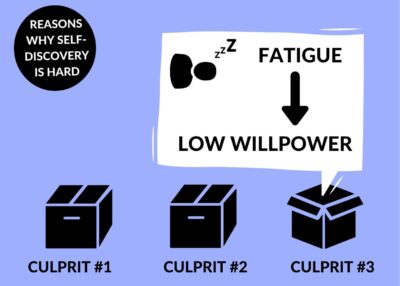
You might be thinking, So I’ve got to fight back against my internal brain AND my external society?! This sounds exhausting.
Well, friends, I’m not going to sugarcoat it for you… it is. I probably don’t have to remind you of the anxiety, limiting beliefs, and lack of motivation you feel daily. (Nor will I make you reflect on your failed goals or your lost sense of purpose… (oops, I probably just did).)
You see, every time you make a decision, you must tap into your brainpower and motivation. The bigger the decision, the more energy you must summon (and, usually, the more anxiety you’ve got to fight back).
Unfortunately, our brainpower and motivation is not an unlimited supply. Quite the opposite, actually. We’ve got a finite amount of energy to tap into each day.
Even more unfortunately, the changes in our society require more and more energy from us each day.
- Our culture of “more, more, more” inundated us with choices every day. A simpler past presented us with a couple of options, if that. Today, we’re presented with endless options – for just about everything – on a daily basis. (Look up something on Amazon, and you know what I mean.)
- Our ability to share information has drastically expanded our world. While this has its positives, it has also created so many more life possibilities. More possibilities lead to more options, which leads to more stressful choices.
- The human brain can only handle so many choices before it gets tired out. That’s why our brains have created shortcuts and biases to help us process information. But the more choices we have to make, the more we’re draining our mental capacity.
If you have to make three decisions a day, you probably won’t have a problem. But if you have to make twenty decisions, you’ll become exhausted. Our days are filled with choices, half of which we don’t even realize we’re making.
This excess decision-making takes us away from what we want. It leaves us little energy to contemplate the important questions that bring us meaning.
Designing your environment for success is critical in preserving your willpower. The other essential step you can take? Learn how defining your personal philosophy can eradicate many of these obstacles.
.
What is a personal philosophy?
A personal philosophy is a clear, concise principle (or set of principles) that will guide your life. Your personal philosophy is grounded in your core values; in essence, your philosophy and values define who you are, what you stand for, and what brings you to life.
In his book Create to Compete, Dr. Michael Gervais says the first thing you should ask yourself is, “Do I have a personal philosophy?” According to the author, creating a personal philosophy is central to improving and optimizing your mindset.
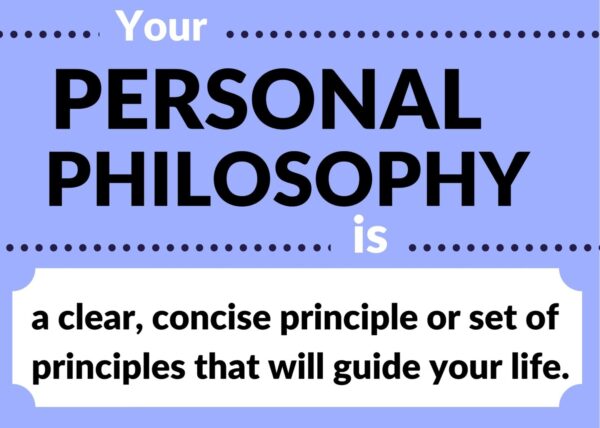
It’s important to note that defining your personal philosophy is not rooted in action or goals. One of our society’s biggest traps is our fixation on “doing” rather than “being.” Our culture promotes productivity, busyness, and constant progress – often at the expense of being aware of ourselves in the present. (Read more about the difference between Doing and Being here.)
Your personal philosophy should be more about your “being.” While it may lead to actions and goals, it shouldn’t start with them. Personal philosophies are about who you are (or who you want to be).
Consider some clichés you’ve heard in life. Whether original or not, they can be a good starting ground for what an example of a personal philosophy might look like.
- “Love your neighbor like yourself.”
- “Always choose what is right over what is easy.”
- “If you’re not moving forward, you’re moving backward.”
I’ll get into how to define your personal philosophy in a moment. First, it’s essential to understand how a personal philosophy can help you with all the deadly obstacles we just discussed.
.
What does defining your personal philosophy have to do with choice and decision-making?
A quick recap of why life choices are challenging. Making decisions is challenging and exhausting because:
- Our human nature associates decisions with anxiety, fear, and lack of control.
- Our cultural expectations influence what we think we should do (and our need for belonging makes us afraid to risk rejection).
- An overabundance of choices depletes our brainpower and motivation.
Now, we cannot change these three facts – but we can limit their influence on our decision-making. In doing so, we’ll decrease the anxiety we feel and the energy it sucks.
How do we achieve these results?
The more we can limit the number of decisions and options we have, the less anxiety we will feel. Consequently, the more meaning we will create in our lives.
.
Life Choices with a Purpose
Imagine your life like it’s a trip to a big store (I’m talking Walmart Supercenter type of store). Different areas of the store represent different stages of your life. The various aisles are stocked full of products (aka Life Choices) you must decide between.
Of course, each Life Choice has a cost, whether financial, time, quality of relationship, happiness, etc.
Now imagine that you’re just set into this store and instructed to “design your life.” You’ve come without any pre-planning or shopping list. Once you go through an aisle, you’re rarely allowed to go back to it. Some sales are only temporary. Oh, and voices are continuously playing over the loudspeaker telling you what you should do.
How stressful and exhausting would that be? For some of us, indecision wouldn’t just create anxiety – it’d completely paralyze us. Not to mention the buyer’s remorse we’d feel after the fact.
I want you to clear that visual from your mind.
Now, imagine if you can go into the store armed with a list and Shopping Principle. You’ve got a basic idea of which Life Choices you want to pick up. When faced with a decision – perhaps when there are various options or a few new aisles to peruse – you can refer to your Shopping Principle. If the Life Choice is in line, you go with it. If not, you move on.
How much easier would this be? How much more confidence would you feel in your choices?
The difference between these two scenarios is what a personal philosophy can give you in life.
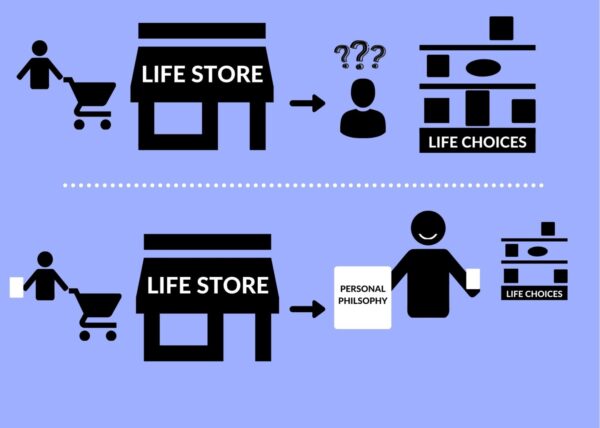
.
Defining Your Personal Philosophy will Decrease the Number and Pressure on Your decisions.
By defining your personal philosophy, you will have a guiding principle to test all of your decisions against. If a choice aligns with your personal philosophy, you go for it. If it doesn’t, you move on.
When there are multiple options, you distinguish which one best fits in with your personal philosophy. (And if they all match up? Then you can feel less anxiety over making a wrong choice.)
Furthermore, you can completely disregard decisions that don’t fit in with your personal philosophy in the first place.
It’s not an exact science, and uncertainty will still exist. However, it will help you shift anxiety-filled decisions into more favorable opportunities for self-discovery.
For example, let’s say my personal philosophy is, “Relationships come before anything else.” At work, I’m trying to decide if I want to take on a new project. It’ll cause me more stress, but it might lead to more growth in my company. Stuck with a pro/con list, I don’t know if I should take it or not.
Referencing my personal philosophy can give me a useful frame to view the decision to. If relationships are my priority, how will each option affect my relationships? Will taking on the new project hurt my relationships with my family more than I can live with? Or will the new project strengthen my relationships with my boss? Which relationships are most valuable to me?
You can probably see that defining your personal philosophy doesn’t eradicate all questions in your life. Instead, it allows you to consider more specific questions that will more quickly get to what gives your life purpose.
.
How to Define Your Personal Philosophy
Defining your personal philosophy is a process, and it’s important to focus on the journey rather than the end result. To take some pressure off, remind yourself that your personal philosophy can change and evolve. One of the most meaningful aspects of life is our ability to grow.
Also, keep in mind that:
- Your personal philosophy should be more about “being” than “doing.” Avoid goals or specific scenarios.
- Your personal philosophy should be short and sweet. It’s not meant to be a life manifesto, but instead a clear and concise guiding principle.
- Your personal philosophy should be rooted in your core values.
- Your personal philosophy cannot be determined by other people. Resist the urge to let others define your philosophy or give you ideas.
.
6 Steps to Define Your Personal Philosophy
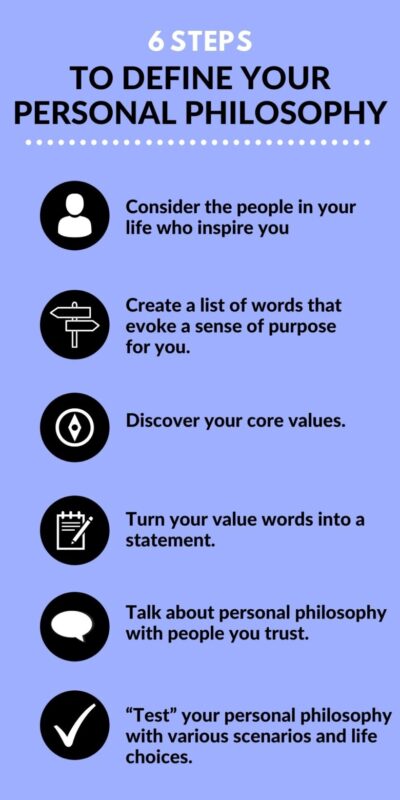
1. Consider the people in your life who inspire you.
It’s difficult to look inward and discover who we want to be. Many of us feel vulnerable with this type of self-reflection. A helpful strategy, then, is to start by looking outside ourselves. Consider the people in your life who inspire you. Write down a list of descriptive words for each person and why they inspire you. This list will be helpful as you contemplate who you want to be.
2. Create a list of words that evoke a sense of purpose for you.
Build off the list of qualities you created with the people who inspire you. What words are associated with your first list? As you develop your list, try to feel the impact of the words. Which ones involve a sense of purpose in you? If you were to print a shirt labeled with the words that inspire you most, which ones would you feel proud displaying on your chest?
3. Discover your core values.
If you’re having trouble coming up with your own words, you can tap into the many lists of core values. There are many activities and quizzes to help you discover your core values. Some might work for you more than others, but the process of self-discovery will undoubtedly help you understand what makes you tick.
4. Turn your value words into a statement.
It can be hard to take all of these words and craft them into one statement. However, this is crucial because it forces you to choose what is most important to you. If you’re feeling all of the negative emotions associated with making this choice, remind yourself that there’s no right or wrong. You can always go back and change your personal philosophy; in fact, keeping an open mind is encouraged.
5. Talk about personal philosophy with people you trust.
Once you’ve established a working personal philosophy, it’s time to put it out into the real world. This step might feel incredibly vulnerable, especially if you’ve created the habit of pleasing others before being your authentic self. Start out with the people you trust the most. Ask them for feedback on the wording, clarity, and accuracy of the statement. Remember, external feedback can help improve your self-awareness, but make sure that you’re not letting others define your core value for you.
6. “Test” your personal philosophy with various scenarios and life choices.
It’s time for you to put your personal philosophy into action. Begin to “test it” in your life, either through real or imagined scenarios. Does your personal philosophy offer more clarity to your life choices? Do you feel good about your choices when using it as your guiding principle? If the answer is “no,” revisit the first few steps as you work to tweak or redefine your personal philosophy. This step never really ends; as you continue to grow and evolve through new experiences, your personal philosophy will grow along with you.
[/fusion_text][fusion_code]PGlmcmFtZSBpZD0iaW50ZXJhY3RBcHA1ZjlmMWFkYTJhNzk5ZDAwMTQ2MmFjNGYiIHdpZHRoPSI4MDAiIGhlaWdodD0iODAwIiBzdHlsZT0iYm9yZGVyOm5vbmU7bWF4LXdpZHRoOjEwMCU7bWFyZ2luOjA7IiBhbGxvd1RyYW5zcGFyZW5jeT0idHJ1ZSIgZnJhbWVib3JkZXI9IjAiIHNyYz0iaHR0cHM6Ly9xdWl6LnRyeWludGVyYWN0LmNvbS8jLzVmOWYxYWRhMmE3OTlkMDAxNDYyYWM0Zi9xLzE/bWV0aG9kPWlmcmFtZSI+PC9pZnJhbWU+[/fusion_code][fusion_text columns=”” column_min_width=”” column_spacing=”” rule_style=”default” rule_size=”” rule_color=”” content_alignment_medium=”” content_alignment_small=”” content_alignment=”” hide_on_mobile=”small-visibility,medium-visibility,large-visibility” sticky_display=”normal,sticky” class=”” id=”” font_size=”” fusion_font_family_text_font=”” fusion_font_variant_text_font=”” line_height=”” letter_spacing=”” text_color=”” animation_type=”” animation_direction=”left” animation_speed=”0.3″ animation_offset=””]
Conclusion: How to Define Your Personal Philosophy
Our lives are made up of thousands of decisions. While life choices give us autonomy in our lives, they also come with an influx of anxiety, fear, and stress.
Making decisions on both a daily-level and grand-level are challenging because:
- Our human nature associates decisions with anxiety, fear, and lack of control.
- Our cultural expectations influence what we think we should do (and our need for belonging makes us afraid to risk rejection).
- An overabundance of choices depletes our brainpower and motivation.
Defining your personal philosophy can help you alleviate these obstacles and bring more meaning to your choices.
A personal philosophy is a clear, concise principle (or set of principles) that will guide your life. Your personal philosophy is grounded in your core values; in essence, your philosophy and values define who you are, what you stand for, and what brings you to life.
To define your personal philosophy, you should:
- Consider the people in your life who inspire you.
- Create a list of words that evoke a sense of purpose.
- Discover your core values.
- Turn your value words into a statement.
- Talk about personal philosophy with people you trust.
- “Test” your personal philosophy with various scenarios and life choices.
Want to eliminate even more stress and anxiety associated with decision-making? Learn how to design your environment for success and why it’s the best thing you can do for your motivation.
[/fusion_text][/fusion_builder_column][/fusion_builder_row][/fusion_builder_container][fusion_global id=”3654″][fusion_builder_container admin_label=”Large Screen follow-up” hundred_percent=”no” hundred_percent_height=”no” hundred_percent_height_scroll=”no” hundred_percent_height_center_content=”yes” equal_height_columns=”no” hide_on_mobile=”small-visibility,medium-visibility,large-visibility” status=”published” border_style=”solid” padding_right=”25″ padding_left=”25″ gradient_start_position=”0″ gradient_end_position=”100″ gradient_type=”linear” radial_direction=”center center” linear_angle=”180″ background_color=”#000000″ background_position=”center center” background_repeat=”no-repeat” fade=”no” background_parallax=”none” enable_mobile=”no” parallax_speed=”0.3″ background_blend_mode=”none” video_aspect_ratio=”16:9″ video_loop=”yes” video_mute=”yes” filter_hue=”0″ filter_saturation=”100″ filter_brightness=”100″ filter_contrast=”100″ filter_invert=”0″ filter_sepia=”0″ filter_opacity=”100″ filter_blur=”0″ filter_hue_hover=”0″ filter_saturation_hover=”100″ filter_brightness_hover=”100″ filter_contrast_hover=”100″ filter_invert_hover=”0″ filter_sepia_hover=”0″ filter_opacity_hover=”100″ filter_blur_hover=”0″ border_sizes_top=”0px” border_sizes_bottom=”0px” border_sizes_left=”0px” border_sizes_right=”0px” type=”legacy”][fusion_builder_row][fusion_builder_column type=”1_1″ layout=”1_1″ spacing=”” center_content=”no” link=”” target=”_self” min_height=”” hide_on_mobile=”small-visibility,medium-visibility,large-visibility” class=”” id=”” background_color=”” background_image=”” background_image_id=”” background_position=”left top” background_repeat=”no-repeat” hover_type=”none” border_color=”” border_style=”solid” border_position=”all” border_radius=”” box_shadow=”no” dimension_box_shadow=”” box_shadow_blur=”0″ box_shadow_spread=”0″ box_shadow_color=”” box_shadow_style=”” padding_top=”” padding_right=”” padding_bottom=”” padding_left=”” margin_top=”” margin_bottom=”” animation_type=”” animation_direction=”left” animation_speed=”0.3″ animation_offset=”” last=”true” first=”true” border_sizes_top=”0px” border_sizes_bottom=”0px” border_sizes_left=”0px” border_sizes_right=”0px” type=”1_1″][fusion_title hide_on_mobile=”small-visibility,medium-visibility,large-visibility” class=”” id=”” content_align=”center” size=”1″ font_size=”” line_height=”” letter_spacing=”3px” margin_top=”5px” margin_bottom=”-40px” margin_top_mobile=”” margin_bottom_mobile=”” text_color=”#ffffff” style_type=”double solid” sep_color=”#0220ff” margin_top_small=”” margin_bottom_small=””]
FOLLOW-UP QUESTIONS
[/fusion_title][fusion_text columns=”” column_min_width=”” column_spacing=”” rule_style=”default” rule_size=”” rule_color=”” hide_on_mobile=”small-visibility,medium-visibility,large-visibility” class=”” id=””]
Comment below with answers, ideas, and more questions, or contact me to collaborate on a future post!
[/fusion_text][fusion_builder_row_inner][fusion_builder_column_inner type=”1_2″ layout=”1_2″ spacing=”” center_content=”no” hover_type=”none” link=”” target=”_self” min_height=”” hide_on_mobile=”small-visibility,medium-visibility,large-visibility” class=”” id=”” background_color=”” background_image=”” background_position=”left top” background_repeat=”no-repeat” border_color=”” border_style=”solid” border_position=”all” border_radius=”” box_shadow=”no” dimension_box_shadow=”” box_shadow_blur=”0″ box_shadow_spread=”0″ box_shadow_color=”” box_shadow_style=”” padding_top=”” padding_right=”” padding_bottom=”” padding_left=”” dimension_margin=”” animation_type=”” animation_direction=”left” animation_speed=”0.3″ animation_offset=”” last=”false” first=”true” border_sizes_top=”0px” border_sizes_bottom=”0px” border_sizes_left=”0px” border_sizes_right=”0px” spacing_right=”” type=”1_2″][fusion_title hide_on_mobile=”small-visibility,medium-visibility,large-visibility” class=”” id=”” content_align=”center” size=”4″ font_size=”30px” line_height=”” letter_spacing=”1px” margin_top=”” margin_bottom=”-10px” margin_top_mobile=”” margin_bottom_mobile=”-10px” text_color=”#ffffff” style_type=”single dashed” sep_color=”#022cff” margin_top_small=”” margin_bottom_small=”-10px”]
EXPLORING YOURSELF
[/fusion_title][fusion_checklist icon=”fa-question-circle fas” iconcolor=”#0216f2″ circle=”no” circlecolor=”#e0e0e0″ size=”18px” divider=”yes” divider_color=”#ffffff” hide_on_mobile=”small-visibility,medium-visibility,large-visibility”][fusion_li_item icon=””]
Do you have principles that guide your life?
[/fusion_li_item][fusion_li_item icon=””]
How often do you feel stressed about making decisions?
[/fusion_li_item][fusion_li_item icon=””]
How could having a personal philosophy remove stress from your life?
[/fusion_li_item][/fusion_checklist][/fusion_builder_column_inner][fusion_builder_column_inner type=”1_2″ layout=”1_2″ spacing=”” center_content=”no” hover_type=”none” link=”” target=”_self” min_height=”” hide_on_mobile=”small-visibility,medium-visibility,large-visibility” class=”” id=”” background_color=”” background_image=”” background_position=”left top” background_repeat=”no-repeat” border_color=”” border_style=”solid” border_position=”all” border_radius=”” box_shadow=”no” dimension_box_shadow=”” box_shadow_blur=”0″ box_shadow_spread=”0″ box_shadow_color=”” box_shadow_style=”” padding_top=”” padding_right=”” padding_bottom=”” padding_left=”” dimension_margin=”” animation_type=”” animation_direction=”left” animation_speed=”0.3″ animation_offset=”” last=”true” first=”false” border_sizes_top=”0px” border_sizes_bottom=”0px” border_sizes_left=”0px” border_sizes_right=”0px” type=”1_2″][fusion_title hide_on_mobile=”small-visibility,medium-visibility,large-visibility” class=”” id=”” content_align=”center” size=”4″ font_size=”30px” line_height=”” letter_spacing=”1px” margin_top=”” margin_bottom=”-10px” margin_top_mobile=”” margin_bottom_mobile=”-10px” text_color=”#ffffff” style_type=”single dashed” sep_color=”#0220ff” margin_top_small=”” margin_bottom_small=”-10px”]
EXPANDING YOUR WORLD
[/fusion_title][fusion_checklist icon=”fa-question-circle fas” iconcolor=”#0216f2″ circle=”no” circlecolor=”#ffffff” size=”18px” divider=”yes” divider_color=”#ffffff” hide_on_mobile=”small-visibility,medium-visibility,large-visibility”][fusion_li_item icon=””]
How much can core values contribute to our sense of purpose?
[/fusion_li_item][fusion_li_item icon=””]
How much vulnerability is required to define your personal philosophy?
[/fusion_li_item][fusion_li_item icon=””]
What can we do to create a society that encourages values over achievement?
[/fusion_li_item][/fusion_checklist][/fusion_builder_column_inner][/fusion_builder_row_inner][/fusion_builder_column][/fusion_builder_row][/fusion_builder_container]



